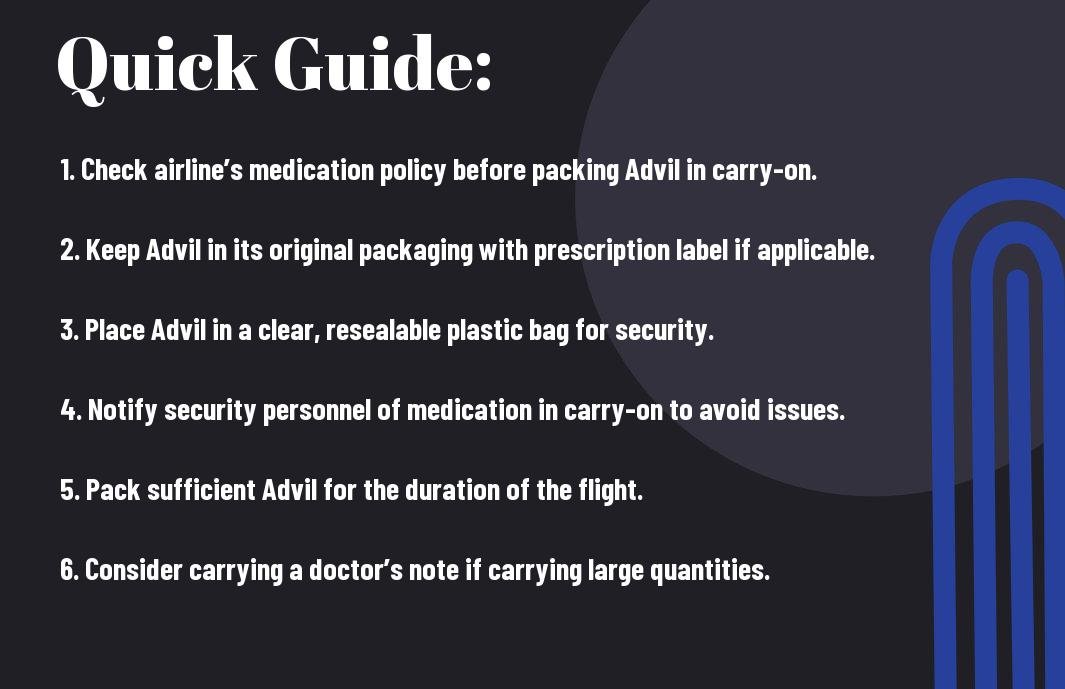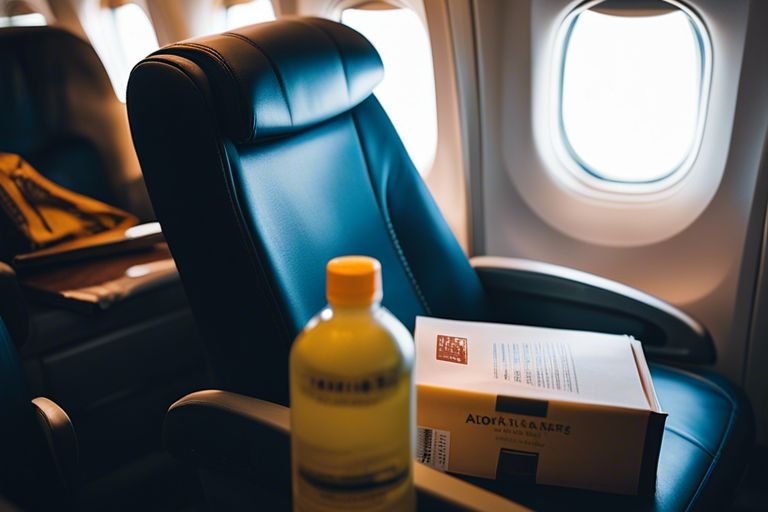Navigating through the myriad of airline policies and regulations can be a daunting task, especially when it comes to bringing medications on board. As a frequent traveler, I have encountered several challenges when it comes to bringing medications on flights, particularly over-the-counter options like Advil. This guide will provide you with essential information on how to navigate medication policies during flights, including the rules and regulations surrounding bringing medications like Advil on a plane, as well as important tips for ensuring a smooth and hassle-free experience. Whether it’s for a headache or other medical condition, understanding the guidelines for bringing Advil aboard a plane is crucial for a stress-free journey.
Key Takeaways:
- Consult the TSA guidelines: Before traveling with medications, it is crucial to check the Transportation Security Administration (TSA) guidelines to ensure that you are following the rules and regulations.
- Pack medication in your carry-on: It is recommended to pack your medication in your carry-on bag to ensure that you have easy access to it during the flight and to avoid any potential issues with lost luggage.
- Properly label medications: It is important to properly label all medications, especially if they are not in their original packaging, to avoid any confusion or suspicion during the security screening process.
- Be prepared to show documentation: In some cases, it may be necessary to show documentation, such as a prescription or a doctor’s note, for certain medications, so it is important to have these items readily available when going through security.
- Be aware of international travel restrictions: When traveling internationally, it is important to be aware of the specific medication regulations and restrictions of the country you are visiting, as they may have different policies from the TSA.
Types of Medications Allowed on a Plane
The transportation security administration (TSA) has specific rules and regulations when it comes to transporting medication on a plane. It’s important to familiarize yourself with these guidelines before you pack for your trip. Here are the types of medications allowed on a plane, as well as some important tips for traveling with your medications.
| Allowed Medications | Special Considerations |
| Over-the-counter medications | Prescription medications |
| Insulin and other diabetes-related medications | Medical marijuana |
| EpiPens and other injectable medications | Liquid medications over 3.4 ounces |
| Allergy medications |
Over-the-Counter Medications
When it comes to over-the-counter medications, you can typically bring them on the plane in your carry-on bag. This includes pain relievers, antacids, and allergy medications. Just be sure to pack them in their original containers and label them properly. If you have any concerns, it’s always best to check with the TSA before your trip.
Prescription Medications
For prescription medications, you are allowed to bring them on the plane in your carry-on bag as well. It’s a good idea to bring a copy of your prescription or a letter from your doctor explaining the need for the medication. This can help if you encounter any issues with security. Additionally, be sure to pack enough medication to last you for the duration of your trip, as well as a few extra days in case of delays. Always keep your medications in their original packaging to avoid any complications at security.
Tips for Taking Medications on a Plane
While traveling with medications can seem overwhelming, there are a few tips that can help make the process easier. Here are some important tips to keep in mind:
- Check the airline’s policy: Before your trip, be sure to research the airline’s policy on carrying medications. Some airlines may have specific requirements or restrictions.
- Keep medications in their original packaging: It’s important to keep your medications in their original packaging to avoid any issues at security checkpoints. This also helps to identify the medication in case of an emergency.
- Carry a doctor’s note: If you’re traveling with prescription medications, it’s a good idea to carry a doctor’s note stating the necessity of the medication. This can help explain the contents of your carry-on bag to security.
- Be aware of liquid restrictions: If you are carrying liquid medications, be sure to comply with the TSA’s 3-1-1 rule for liquids in carry-on luggage. This means each liquid must be in a 3.4-ounce container or smaller, all liquids must fit in a single 1-quart plastic bag, and each passenger is limited to one bag.
This information can help ensure that you are properly prepared when traveling with medications.
Packing Medications Properly
When packing medications for a flight, it’s important to keep them in their original packaging to avoid any confusion at security checkpoints. I always make sure to label all medications clearly and carry a copy of my prescription in case it’s requested by security. Additionally, I always pack all medications in my carry-on bag to prevent any issues with lost luggage.
Knowing the Airline’s Policy
Before traveling with medications, I always check the airline’s policy to ensure compliance with any specific regulations they may have. I find that being aware of any restrictions or requirements helps to avoid any potential issues during my trip.
Bringing Necessary Documentation
When traveling with prescription medications, I always make sure to carry a doctor’s note outlining the necessity of the medication. This important documentation can help to explain the contents of my carry-on bag to security and prevent any delays during the screening process.
Step-by-Step Guide to Bringing Medications on a Plane
To ensure a hassle-free experience when traveling with medications, it’s important to follow a few steps when preparing for your flight. Below, I’ve outlined a step-by-step guide to help you navigate the process of bringing medications with you on a plane.
| Step 1: | Checking TSA Regulations |
| Step 2: | Notifying Airport Security |
| Step 3: | Storing Medications During the Flight |
Checking TSA Regulations
When traveling with medications, it’s crucial to be aware of the Transportation Security Administration (TSA) regulations. Before packing your medications, I recommend checking the TSA guidelines to ensure that you comply with their rules and regulations. This may include restrictions on the types of medications allowed, as well as the quantity and packaging requirements. By familiarizing yourself with the TSA regulations, you can avoid any potential issues at the airport security checkpoint.
Notifying Airport Security
Before going through the security checkpoint, it’s important to notify airport security that you are carrying medications. This can help facilitate the screening process and ensure that you have the necessary documentation or information readily available if requested. Additionally, if you have any concerns about specific medications or medical devices, I recommend contacting the TSA in advance to address any questions or issues.
Storing Medications During the Flight
During the flight, it’s important to store your medications in a safe and accessible manner. I recommend keeping your medications in your carry-on bag to ensure that they are easily accessible during the flight. It’s also a good idea to pack any necessary medical supplies, such as syringes or EpiPens, in case of emergencies. Additionally, for long flights, I suggest bringing extra medication in case of unexpected delays or layovers. I also recommend keeping a copy of your prescription or a doctor’s note on hand, as it can be helpful in the event of any inquiries from airport or airline staff.
Factors to Consider When Bringing Medications on a Plane
Despite the convenience of air travel, bringing medications on a plane requires careful consideration. Here are some key factors to take into account:
- Security regulations – Always check the airline and country-specific regulations regarding carrying medication on board. Some medications may be restricted or prohibited, and certain documentation may be required.
- Storage and transportation – Consider the duration of the flight and the storage requirements of your medication. Ensure that you have the necessary means to transport and store your medication safely during the flight.
- Destination country’s regulations – Research the medication policies of the country you are traveling to, as they may have specific restrictions or requirements regarding certain medications.
Perceiving these factors beforehand can help ensure a smooth journey without any complications related to your medication.
Duration of the Flight
When considering bringing medications on a plane, the duration of the flight is an important factor to take into account. For shorter flights, you may only need to carry the necessary amount of medication for the duration of the journey. However, for longer flights or travel involving layovers, it is advisable to carry extra medication in your carry-on luggage in case of unexpected delays or emergencies. This ensures that you have access to your medication throughout the journey, minimizing any risks associated with running out of medication during travel.
Destination Country’s Regulations
It is crucial to research the regulations of the country you are traveling to regarding the medication you intend to carry. Some countries have strict policies on the import of certain medications, requiring specific documentation or permits. Failure to comply with these regulations can lead to confiscation of your medication or legal repercussions. By familiarizing yourself with the destination country’s regulations beforehand, you can avoid any potential issues and ensure a hassle-free experience.
Medical Conditions and Needs
When bringing medications on a plane, it is essential to consider your specific medical conditions and needs. If you have a chronic medical condition that requires regular medication, it is crucial to ensure that you have an adequate supply for the entire duration of your trip. Additionally, if you require specialized equipment or specific types of medication, it is advisable to carry a doctor’s prescription or medical certificate to facilitate the security screening process and demonstrate the necessity of your medication.
The Pros and Cons of Bringing Medications on a Plane
Not all travelers know that they can bring medications on a plane. This is a significant convenience for those who need to take regular medication, but it also comes with potential risks that travelers need to be aware of. Let’s take a closer look at the pros and cons of bringing medications on a plane.
| Pros | Cons |
| Convenience and immediate access to medication during travel | Risks of mishandling or loss of medication |
| Peace of mind knowing you have your necessary medication with you | Potential issues with security and customs regulations |
| Ability to take medication at scheduled times | Possibility of medication being confiscated or restricted |
| Emergency access to medication during a mid-flight medical issue | Risk of medication expiring or spoiling during travel |
| Comfort in having familiar medication available in case of illness or injury | Extra responsibility in ensuring safe and proper storage of medication |
Convenience and Immediate Access
When I travel, having my medications with me provides convenience and immediate access to the medication I need, especially during long flights or layovers. I don’t have to worry about trying to find a local pharmacy in a foreign country or going without my necessary medication if my luggage is delayed or lost.
Risks of Mishandling or Loss
On the other hand, bringing medication on a plane comes with the risks of mishandling or loss. There is always a possibility that my medication could be misplaced, damaged, or exposed to extreme temperatures during the journey, potentially compromising its effectiveness.

Can You Take Advil on a Plane – Navigating Medication Policies During Flights
From above information, it is clear that navigating medication policies during flights can be challenging, especially when it comes to over-the-counter medications like Advil. Understanding the rules and regulations set forth by airlines and the TSA is crucial in ensuring a smooth and stress-free travel experience. Always keep your medication in its original packaging, carry a doctor’s note if necessary, and familiarize yourself with the specific guidelines for the airline you are flying with. By following these steps, you can ensure that you have the necessary medication with you while complying with all relevant regulations.
FAQ
Q: Can I Take Advil on a Plane?
A: Yes, you can take Advil on a plane. It is generally allowed to bring over-the-counter medications like Advil in your carry-on luggage. However, it’s always a good idea to check the specific regulations of the airline and country you are traveling to, as policies may vary.
Q: How should I pack Advil for a flight?
A: It is best to pack Advil in its original, labeled container to avoid any issues at security checkpoints. If you have a prescription for Advil or any other medication, be sure to bring it along as well.
Q: Are there any restrictions on bringing Advil on international flights?
A: In some countries, certain medications that are common in one country may be restricted or prohibited in another. It’s important to research the specific regulations of the country you are traveling to, and if in doubt, consult with a medical professional or the embassy of the country you are visiting.
Q: Can I bring liquid Advil in my carry-on luggage?
A: In accordance with the TSA’s liquid regulations, you can bring liquid Advil in containers that are 3.4 ounces or less, and they must be placed in a clear, quart-sized plastic bag. Be sure to follow these guidelines to avoid any issues at security checkpoints.
Q: What should I do if I have a medical condition that requires Advil during a flight?
A: If you have a medical condition that necessitates taking Advil during a flight, it’s important to communicate with the airline and seek guidance from a healthcare professional. Airlines may have specific protocols for passengers with medical conditions, and it’s essential to be prepared and knowledgeable about the policies and procedures in place.












